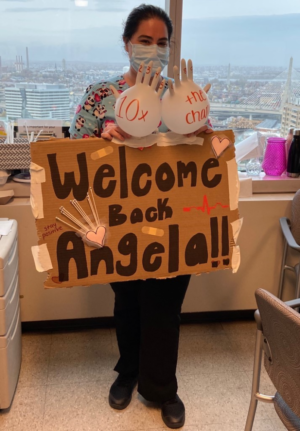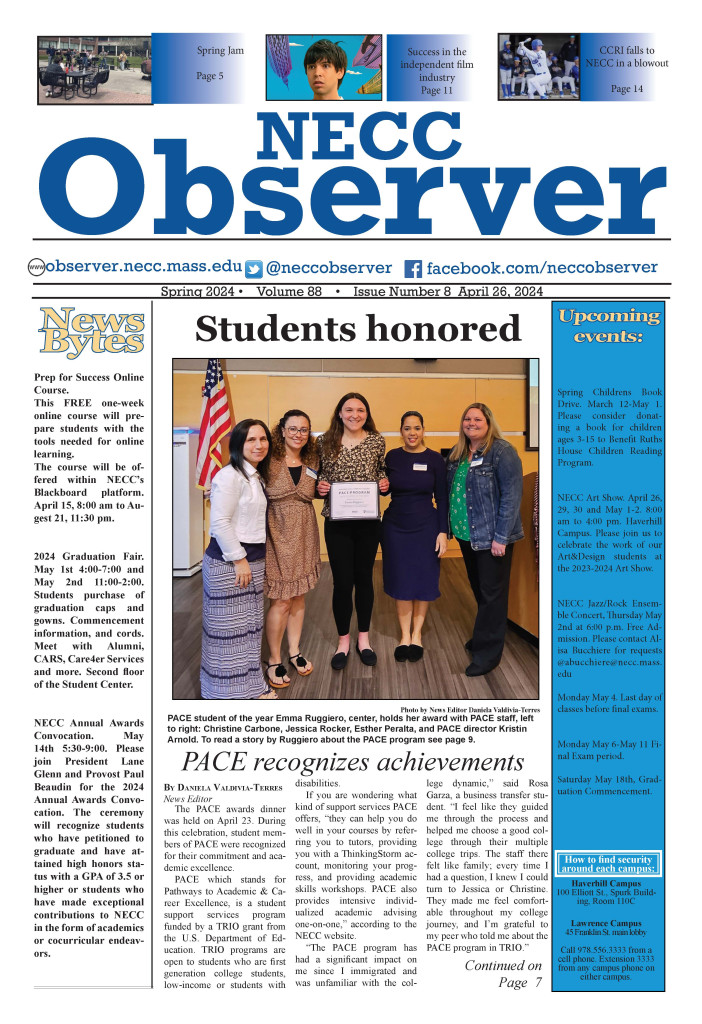
Angela Pagliuca, 33, of Revere is a registered nurse. She works on a gynecology oncology and surgical unit at Massachusetts General Hospital in Boston. She also works per diem at Eastpointe in Chelsea. “I do a lot! ” she said with a laugh.
On March 19, Pagliuca received a phone call. Someone she had been in close contact with at work on the previous Sunday had tested positive for COVID-19 and she would have to quarantine for two weeks. She hadn’t had much time to worry about getting sick as the pandemic was still relatively new in the United States.
“I was actually still trying to plan a vacation for my birthday,” she said. Her birthday being about a month away on April 17. She expected her quarantine period to be long over by then.
Being a nurse, Pagliuca knew there was potential for being exposed to the coronavirus. “Working in health care I knew it would be a risk. We’re exposed to so many things,” she said. She felt safe working at MGH and knew there would be enough personal protection equipment available. She admits to being “petrified” of being called to work at Eastpointe which is a nursing home and could possibly not have as much access to PPE as the formidable MGH. Either way Pagliuca wanted to be part of the solution. “I wanted to make a difference and help people through this difficult time,” she said.
By the time she had been notified of her exposure to COVID-19, it had already been over four days. Pagliuca was feeling fine. “I didn’t think I had it because I felt so good,” she said. With the amount of time that had passed she just couldn’t imagine there would be a chance she’d develop any symptoms.
Then came day five after exposure. It “started with a sore throat in the morning. Later in the afternoon fever, chills, headache, body aches and cough. I felt like I had typical symptoms,” she said. “Felt horrible, like I got run over by a truck… like I had no control. My body was shivering and I couldn’t stop.”
Her fever went as high 102.9 degrees. “At one point I was checking every 10 minutes,” she said.
She would tell her boyfriend, “Check on me to make sure I’m breathing all night.” At this point fear had set in, “I was being crazy,” she said.
Pagliuca lives in a two-bedroom apartment with her boyfriend Standley Francois and was able to isolate successfully. She stayed in their bedroom while Francois stayed in the rest of the house and slept in the spare bedroom on an air mattress. This strict quarantine went on for two weeks once Pagliuca’s symptoms started. Francois would leave meals outside of Pagliuca’s bedroom door, which she insisted remain open, “I don’t like the door closed,” she said.
They had to come up with a solution for sharing the single bathroom in their apartment. They followed a schedule for showering and wiped everything in the bathroom down after each use.
Francois also had to shelter in place for the first two weeks after Pagliuca tested positive on March 21. “He had to be quarantined for two weeks but was laid off anyway,” said Pagliuca. Once his two-week period was over Francois could go to the grocery store and run errands. Fortunately, Francois never showed any signs of being infected with the coronavirus.
There is currently no cure for COVID-19. However, Francois’s Haitian mother was ready and willing to come to the rescue with home remedies and comfort food. “Standley literally called his mom that night and she sent ginger, garlic and lemon tea and vegetable soup,” said Pagliuca.
After a week and a half, Pagliuca was feeling better. Her fever had broken but had a lingering cough for three more weeks. She would leave her room and go into the rest of the apartment. She would still wear a mask in the common areas and Francois continued to sleep in the spare room until it was confirmed that the virus had completely left Pagliuca’s body.
The testing process was “horrible,” said Pagliuca. However, all her initial tests indicated she was still infected. From March 21 to April 29 she was tested 10 times. Four tests were positive, two were considered false negatives, meaning a negative test followed by a positive test, two tests were inconclusive and her last two tests were negative.
It was a total of six weeks of quarantine and isolation for Pagliuca, except for those days when she would go the testing site hoping that her results would come back negative.
The physical part of this disease had come and was making its way out. Mentally and emotionally Pagliuca was still in a battle. Being away from her family, friends, and co-workers was taking a toll on her. “My best friend Sarah and I are always together so that was hard to be apart. Also, I watch my nephew once a week and that was heartbreaking because I would FaceTime him every day and he would read me stories. He’d carry me around everywhere on the phone. He’d forget me in the tent and my sister would call out ‘Where’s the phone?’,” she said through a chuckle.
“I felt depressed for a little while, week three was my worst. Felt better but realized that I still had be at home and confined, realized could still infect and hurt someone else,” said Pagliuca. Francois was a vital part in helping her get through the long six-week ordeal. “He’s a good motivational talker. He explained the big picture. I’m not admitted. I have him. I have my phone.” she said.
Surviving a disease that has taken so many lives could easily leave a mark on someone’s perspective on life. “I feel like it did teach me that I had to take a step back. I’m usually someone on the go even when not feeling well, this forced me not to move,” she said.
The coronavirus remains an enigma as far as who and how it attacks. The potential side effects once a person has recuperated are also still uncertain. “…my cough wasn’t going away. At week five I felt like my respiratory was normal. I was afraid for a while. ‘Could there be scarring on the lungs?’ We don’t know the long-term effects yet,” said Pagliuca.
Now that Pagliuca is on the other side of this COVID-19 disease, there is still the lingering concern that immunity is not guaranteed. Part of her feels like perhaps she can’t catch it again, but she is choosing to “act like I can for the safety of other people. I would like to be a case study,” she said.
Pagliuca said she felt “Amazing!” when she finally tested negative. “I screamed out for joy, texted everyone on my phone, emailed Adele and Molly [her bosses] before calling occupational health. Results came in at 7:30 a.m. I woke up at 6 a.m., you get a letter in your Gateway account with result if negative.” Pagliuca wanted to make sure she was up and ready to see that letter should up on her patient portal.
Pagliuca’s friends and family were also excited to find out she had finally beat the coronavirus. They were “relieved because I stopped complaining, ‘Oh good, you can go back to work now,’” she mimicked. “My nephew was excited to see me,” she added.
Pagliuca’s return to work was long awaited by her as well as her co-workers who missed her dearly.
“So happy to have her back! She is a sweetheart!” exclaimed nurse case manager Ann McKenney-Fruth.
She was excited to get back to helping people, patients and fellow nurses alike. “I get to be myself again, catch up on gossip and eat all the food,” she paused. “and get to make a difference.”
“We are delighted to have her back! We missed her energy for the last six weeks,” said patient care associate Kalsang Nangpa. “She is the life of the party. She was back on a Thursday and by Sunday had organized and thrown a baby shower for Em J [a fellow nurse who is expecting a baby in June].
Pagliuca can attest to how easy it can be getting worked up over being sick with the coronavirus. Anxiety can set in and be just as damaging as the virus itself. “Try your best to stay as positive as you can, move around, [practice] deep breathing exercises, drink warm liquids– I was drinking hot water with lemon,” she said.
Pagliuca says that having a “very good support system” helped her get through the illness. “My sister and nephew FaceTime would make me smile. My lovely coworkers checking in frequently, and mother in law made sure I was fed,” she
said.

